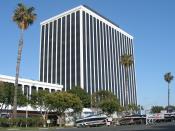As acceptance of the Internet has become more widespread, online users have found the Internet to be an indispensable source of information. Information about products, places, people, and ideas is freely available online. Media is digitized, making it easier to copy and share creative works such as literature, music and video recordings. Improved communications have paved the way for people to do business without the ties of geography or time. In short, the Internet allows people to participate in many activities that would otherwise be unavailable. But with any new technology arises the question: "just because I can, does this mean I should?" This paper will concentrate on the subject of intellectual property and special considerations with respect to the Internet.
Intellectual PropertyIntellectual property is a term used to describe anything, created with the use of human intellect that has a commercial value. Intellectual property can be ideas, or the physical representation of ideas, and often takes the form of literary works (books, novels, screenplays), movies, photographs, musical recordings, works of art, computer software and inventions.
Intellectual property, according to modern law, has an owner and can be bought, leased or sold. (Fishman, 1994). Establishing ownership of intellectual property is key, because the laws hold that the owner has the right to control the use of and monetary rewards arising from this property.
Copyrights, Trademarks and PatentsCopyright gives the author of an intellectual work the right to control how the work is used or distributed. The law provides for compensation to the author if the property is used without the permission of the author. Copyright ownership can be established simply by including a copyright symbol ÃÂ with the publication date and copyright owner's name. Note that most web sites have a copyright notice at the bottom of each page.
A trademark is any visual symbol that accompanies a product or service, and serves to identify the owner as unique or distinct from other makers of the product. Once properly registered at the federal or state level, a trademark may be used only by the owner, unless permitted by the owner. It is up to the owner to take steps to prevent unauthorized use of a trademark. A patent applies to inventions, and gives the inventor property rights to that patent. The patent gives the inventor the right to prevent others from using, selling, or otherwise profiting from the invention. (2004, USPTO.GOV)Copyrights, trademarks and patents have long been sought by owners, and used successfully to protect the value of intellectual property. Awareness of the legal requirements of copyrights prevents many people from sharing or copying information illegally. Others will ignore the laws, but they have often been deterred or limited by the cost of copying, and the likelihood of detection and resulting penalties.
Internet as a medium for infringementThe Internet has made unauthorized use of intellectual property easier than ever before. The democratic nature of the Internet means that anyone can find any bit of information that has been posted online, anywhere, any time. Online viewers can find and use information from newspapers and magazines with great ease. Students have found they can easily copy and reuse this information in their class work. In the late 1990's, online music sharing sites appeared by the dozens, allowing millions of Internet users to copy thousands of songs and movies, with little cost or chance of getting caught. Or so they thought.
The democratic nature of the Internet has also made it easy for copyright and trademark owners to find unauthorized users. While students are searching for, and using copyrighted materials, teachers can easily find the source of a suspicious phrase in a term paper. Online music sharers have found that they are not necessarily anonymous, since each computer on the Internet can be uniquely identified and tied to an Internet service account. This was illustrated in dramatic fashion, in the summer of 2003, when the RIAA (Recording Industry Information of America) filed lawsuits against hundreds of individuals who shared musical recordings from their home computers. (Phan, 2003)The RIAA lawsuits have not stopped illegal downloads, but the volume has decreased. Some music lovers find downloading to be more difficult than purchasing a CD, and others are deterred by the fear of being slapped with a lawsuit. Still others, who have never downloaded illegal copies of music, say they will not do so because of the threat of lawsuits. (Keefe, 2004)Domain NamesDomain names have gained prominence as a new form of intellectual property. A domain name is the name of an Internet site (i.e. cnn.com, phoenix.edu, irs.gov). The domain name is an alias for the numeric address of the Internet site. Type cnn.com and your browser will take you to the server at IP (Internet Protocol) address 64.236.16.4. Phoenix.edu is actually found at address 204.17.16.138.
A domain name that is simple and easy to remember can be of great value to a business looking to go online. Domain name registration is not regulated by government, but by a privately funded corporation called ICANN (Internet Corporation for Assigned Names and Numbers). It is ICANN's responsibility to administer and coordinate use of the domain names and IP addresses, to ensure that a domain name will always resolve to the same web site, from anywhere in the world. (2004, icann.org)To purchase a domain name, one must only contact one of ICANN's registration agents, such as networksolutions.com, find a domain name that is not already reserved, and pay a nominal fee to reserve the name. Once a domain name has been reserved, the person who reserved the domain name becomes the owner of that domain name.
In earlier years, before businesses rushed to reserve their company names as Internet domain names, many enterprising (and unscrupulous) individuals reserved well-known names and then offered the domain names for sale. These so-called cyber-squatters often forced individuals and long-time businesses to pay exorbitant fees to purchase their own names on the Internet.
Some businesses fought back by suing the domain name owners for trademark infringement. This was made easier, when the connection between trademark laws and Internet domain names was clarified by the Anticybersquatting Consumer Protection Act, passed by the U.S. congress in 1999. Mattel used a lawsuit to shut down a pornography website, successfully using this lawÿs protection to prevent use of the barbies-playpen.com domain name. (McDonald, 2000)For those businesses or individuals who do not wish to go through the cost of a federal lawsuit, ICANN's Uniform Domain Name Dispute Resolution Policy (UDRP) allows a trademark-holder to use administrative means to gain control of a website held by a cyber squatter. This process is limited, however, to cases where the domain name was purchased in bad faith, solely to sell or rent the name to the trademark owner. (Jarvis, 2000)In other cases, such as www.delta.com, the domain name may not pose a trademark infringement. Delta Financial Corporation, a consumer finance company based in New York, had a legal right to the name ÿDeltaÿ, since their business could not be confused with Delta Airlines. For years, Delta Airlines was forced to use delta-air.com as its domain name, because Delta Financial was the original delta.com registrant. Delta Airlines resolved the problem in July of 2000, by purchasing the delta.com domain name from Delta Financial. (Fonti, 2000)ConclusionAs use of the Internet matures, businesses, governments and individuals have learned how to apply long-standing ownership protections to online forms of intellectual property. Over the past few years, much of the ambiguity and controversy over use of this new medium has been resolved by creating new laws and governing bodies, and by extending the protections of older laws.
ReferencesFishman, S. (1994). Software Development: A Legal Guide. Berkeley: Nolo Press.
Fonti, N. (2000, September 1). Delta carves out e-unit, buys delta.com address. The Atlanta Journal the Atlanta Constitution. Retrieved January 7, 2004 from ProQuest database.
Jarvis, S. (2000, October 23). ICANN sets rules for resolving disputes. Marketing News. Retrieved January 7, 2004 from ProQuest database.
Keefe, B. (2004, April 26, 2004). Music downloads growing modestly. Milwaukee Journal Sentinel. Retrieved May 26, 2004 from ProQuest database.
MacDonald C. (2000, November). Protecting domain names: how to kick cyber-squatter butt without going to court. Digital Marketing. Retrieved January 6, 2004 from ProQuest database.
Phan, M. (2003, September 10). Facing The Music In Piracy Lawsuit. Newsday. Retrieved January 6, 2004 from ProQuest database.
(2004). How does ICANN work? In ICANN FAQs. Retrieved May 26, 2004 from http://icann.org/tr/english.html.
United States Patent and Trademark Office. General Information Concerning Patents. Retrieved May 26, 2004, from http://www.uspto.gov/web/offices/pac/doc/general/index.html#patent


